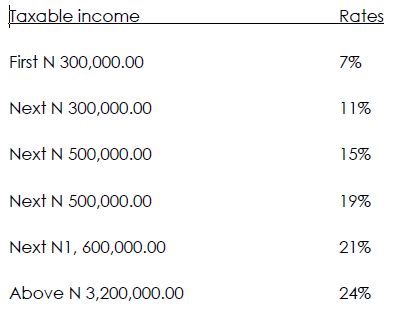Question and Answer: Tax Regime
 Understanding the tax regime: Business names
Understanding the tax regime: Business names
APPLICABLE LAW
Every Business Name owner who earns an income in Nigeria either from employment or from carrying on a business is subject to tax under the Personal Income Tax Act.
INCOME CHARGEABLE
A Business Name owner in Nigeria shall pay tax for each year of assessment on the aggregate amount from every source of income for the year. This includes the profits from trade or business, salaries, wages, fees, allowances or other gains or profits from employment including compensations, bonuses, premiums or benefits given or granted by an employer to an employee, profits and premiums arising from rights granted to another person for the use or occupation of property, dividend, interest, annuity.
THE TAX RATE STRUCTURE
The tax rate for every Business Name owner in Nigeria is charged as follows:

The minimum tax rate has been increased from 0.5% of gross emolument to 1% if the income is below N 300,000.00.
THE TAX IDENTIFICATION NUMBER
A Business Name owner must register with and obtain a Tax Identification Number (‘TIN’) from the State Board Internal Revenue to enable the payment of taxes such as Personal Income Tax, Withholding Tax and also for VAT purposes.
A TIN is an identification number for the business which is used by the Internal Revenue Service in the administration of Tax. A TIN must be furnished on Returns, Statement and other Tax related documents.
FILING OF RETURNS
All taxable persons are required to prepare and submit annual self-assessment tax returns within 90 days from the commencement of every year and include the amount of tax payable.
For each year of assessment, you are required to file a return of income in the prescribed form and containing the following information, with the relevant Tax authority where the taxable person is deemed to be resident:
- the amount of income from every source of the year preceding the year of assessment,
- Such particulars as may be required for the purpose of the Act with respect to any such income, allowances, reliefs, deductions etc.
- A declaration by him or on his behalf that the return contains a true and correct statement of the income disclosed on the form, in accordance with the provisions of the Act.
PAYE
Persons on paid employment pay their personal income tax through the Pay As You Earn (PAYE) system. Under the system, employers deduct the prescribed tax from workers’ salaries and pay directly to the FIRS through the designated banks on behalf of the employees on a monthly basis
THE RELEVANT TAX AUTHORITY
The State Boards of Internal Revenue collect the Personal Income Taxes of:
- Individuals in their various states of residence
- Body of individuals such as communities, families that run a business
- Business names
- Executors of estates of deceased persons and trustees of trusts.
The Federal Inland Revenue Service collects Personal Income Taxes of:
- Persons employed in the Nigerian Army, the Nigerian Navy, the Nigerian Air Force and the Nigerian Police other than in a civilian capacity;
- Officers of the Nigerian Foreign Service;
- Non-residents who derive income or profit from Nigeria
